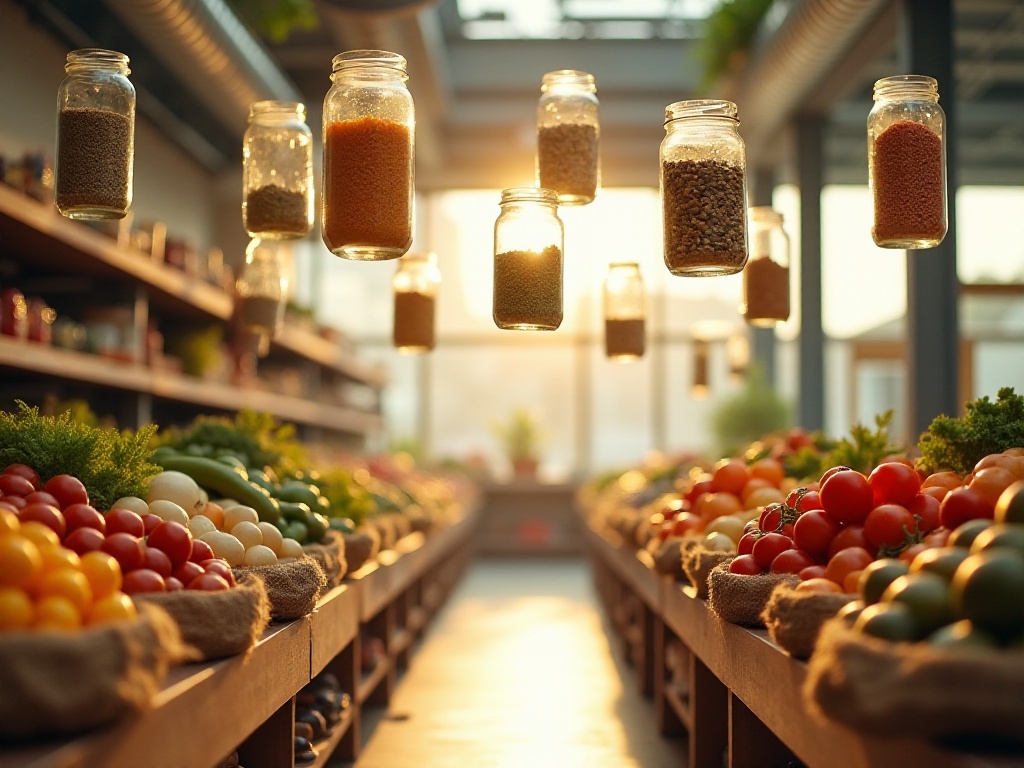Recently while browsing Xiaohongshu, I noticed that "zero-waste living" has become a hot topic. Initially, I thought it was just a gimmick that seemed far removed from our daily lives. However, after practicing it myself for over a year, I discovered that zero-waste living isn't as difficult as imagined - the key is finding methods that work for you. Today I'd like to share my personal experience and some practical tips that might inspire you.
To be honest, I was shocked when I first saw the data. Did you know that in 2023, the average urban resident in China generated 440 kg of waste per year? To put this in perspective, that's equivalent to the weight of 4-5 adults. Even more alarming is that this number keeps growing year by year.
Last year, I specifically tracked my own waste generation, and delivery packaging alone accounted for a significant portion. Think about it - every online purchase generates waste through shipping boxes, plastic foam, and packaging bags. Add to that the various disposable items from daily life, and the total waste is truly staggering. But don't worry, I'll show you how to reduce this waste step by step.
The crucial first step in zero-waste living is understanding your consumption habits. I suggest starting with a super simple experiment: record everything you throw away for one week. I used my phone's notes app, jotting down items while sorting trash each evening.
I remember being shocked during my first experiment. In just one week, takeout containers and various disposable packaging alone generated nearly 2 kg of waste! I realized much of this waste was avoidable, like single-use plastic bags and disposable bubble tea cups. This discovery made me realize I needed to take action immediately.
Often, we generate waste simply for convenience. For example, buying packaged bread or sandwiches when running late for breakfast, buying bottled water when thirsty, or ordering takeout to avoid washing dishes. These seemingly small habits accumulate into large amounts of waste.

When it comes to implementation, I started with the kitchen. I replaced all plastic storage containers with glass jars, which are not only eco-friendly but also look great. Last year during Singles' Day, I bought a set of Mason jars. Though they seemed a bit expensive initially, the money saved on plastic wrap alone could buy several more sets by now.
Glass jars are incredibly versatile and can store various ingredients. Now I bring glass jars to buy rice, flour, and grains from bulk sections at the supermarket, eliminating extra packaging. Seasonings and dry goods are also stored in glass jars, creating a satisfyingly organized look.
Did you know that an average household uses about 100 meters of plastic wrap annually? That's roughly the length of a football field! Replacing it with glass storage containers not only saves money but also reduces plastic waste significantly. Plus, glass jars seal better and keep food fresh longer - a win-win situation.
I particularly love using glass jars as lunch containers. Previous plastic containers would develop odors over time, and I worried about harmful substances leaching when storing hot soup. Glass jars eliminate these concerns, and they look so stylish that my colleagues always admire my lunch setup.
Shopping is one of the easiest places to generate waste. I now carry my "zero-waste shopping kit" when going out. What's in this kit? First, various sized cloth bags for groceries and clothes; then several glass jars for bulk foods; mesh bags specifically for fruits and vegetables; and finally, stainless steel straws to avoid disposable ones.
I've made it a habit to keep these items in my car or everyday bag. This way, I'm never caught without eco-friendly bags or containers when I need to make purchases.
Statistics show that using reusable shopping bags can reduce plastic bag usage by 300 bags per household annually. Imagine the impact if everyone in the neighborhood did this. Many stores now promote eco-friendly shopping bags, and some even offer discounts for bringing your own bags.
I've noticed an interesting phenomenon: shopping with your own containers naturally leads to more rational purchasing. Having to consider container sizes prevents impulse buying like before. This not only reduces waste but also helps control shopping budgets.

Regarding household cleaning, there are many areas for improvement. I've mostly stopped buying commercial cleaners and instead use a combination of baking soda and white vinegar to clean various areas of my home. It's environmentally friendly and highly effective.
The magic of baking soda and vinegar lies in their ability to effectively remove stains and odors without producing harmful substances. For instance, I now clean drains by first pouring in some baking soda, followed by vinegar, letting them react, then flushing with hot water - it works better than chemical drain cleaners.
For cleaning glass, a solution of vinegar and water works wonderfully, leaving no streaks while making glass sparkle. This method works great on my balcony windows, and I don't have to worry about the health impacts of chemical cleaners.
Some might worry about the vinegar smell. Don't worry - the smell dissipates quickly, and you can even infuse the vinegar with lemon or orange peels afterward, which not only removes the vinegar smell but adds a fresh fragrance.

Practicing zero-waste living has brought many unexpected benefits. The most obvious is saving money. According to statistics, families seriously practicing zero-waste living save an average of 15-30% on living expenses annually.
How are these savings achieved? First, by reducing unnecessary purchases. Instead of buying impulsively, I now consider whether items are truly needed. Second, many disposable items have been replaced with reusable alternatives - while initial investment might be higher, it's definitely cost-effective in the long run.
I've also learned to make many things myself. Making my own cleaning products is cheaper and safer; replacing fruit and vegetable bags with mesh bags saves money on bags; bringing lunch instead of ordering takeout is both economical and healthier.

Honestly, when I first started practicing zero-waste living, it seemed really challenging. I would often forget to bring shopping bags and sometimes couldn't resist buying disposable items, but after exploring for a while, I discovered that it's not difficult at all if you progress gradually and start with small steps.
My suggestion is to start with simple things. For example, start carrying a water bottle today to avoid buying bottled water; next week, start bringing your own lunch container to gradually reduce takeout frequency; once these become habits, try making your own cleaning products.
Everyone's lifestyle is different, so suitable approaches vary. The important thing is finding your own pace without putting too much pressure on yourself. Even if you can't achieve complete zero waste, don't blame yourself - reducing waste bit by bit is progress.
My biggest realization now is that zero-waste living is a gradual process. It might seem troublesome at first, but gradually you'll discover that these changes not only make life more environmentally friendly but also bring many unexpected benefits.

Zero-waste living isn't just a lifestyle - it's an attitude. It teaches us how to better cherish resources and care for the Earth. Through more than a year of practice, I deeply understand that small changes from each person accumulate into big steps in protecting the planet.
Often, what we need to change isn't our lifestyle but our mindset. When we start considering the necessity of each purchase and begin paying attention to how our actions affect the environment, we've already taken the first step toward zero-waste living.
As environmental awareness increases, more people are becoming interested in and practicing zero-waste living. I believe this lifestyle will become mainstream in the near future. Let's act together and contribute our part to the Earth's future.
Do you think zero-waste living is difficult? Feel free to share your thoughts and experiences in the comments. Let's learn from each other, progress together, and work toward creating a better future.

 Previous
Previous
